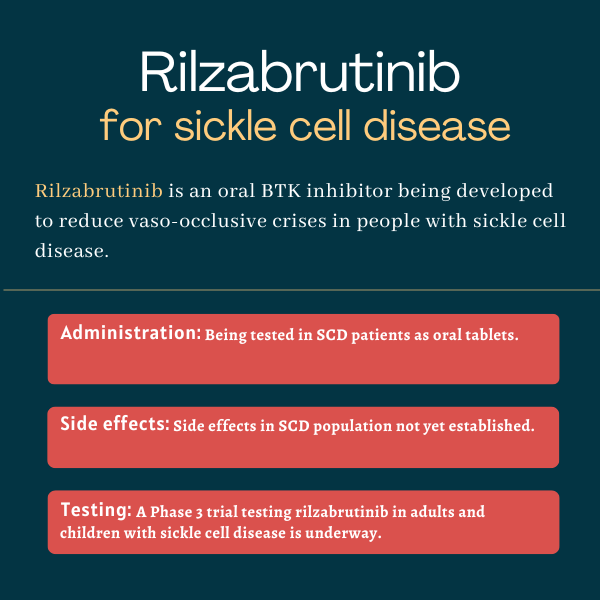Rilzabrutinib for sickle cell disease
Last updated July 30, 2025, by Lindsey Shapiro, PhD

What is rilzabrutinib for sickle cell disease?
Rilzabrutinib is an oral therapy being developed by Sanofi to reduce the occurrence of vaso-occlusive crises (VOCs) in people with sickle cell disease (SCD).
VOCs are sudden and severe pain episodes that arise when the misshapen and rigid red blood cells that characterize SCD block blood vessels and impair oxygen delivery to the body’s tissues.
Rilzabrutinib aims to prevent these episodes by easing the inflammatory processes that contribute to VOC development. It does this by suppressing Bruton’s tyrosine kinase (BTK), an enzyme important for the growth and function of several immune cell types.
Designed for fine-tuned therapeutic activity, rilzabrutinib has the ability to selectively and durably, but also reversibly, bind to BTK. These characteristics may help the therapy maintain a favorable long-term safety and efficacy profile.
In the U.S., the therapy has been granted orphan drug designation for SCD, a status that intends to speed the development of treatments for rare diseases. Sanofi is also developing rilzabrutinib for a range of other immune-mediated diseases.
Therapy snapshot
| Treatment name: | Rilzabrutinib |
| Administration: | Oral tablets |
| Clinical testing: | Currently in Phase 3 testing |
How will rilzabrutinib be administered in sickle cell disease?
In an ongoing Phase 3 trial, the only study to date that has tested rilzabrutinib in people with SCD, the therapy is being administered as oral tablets.

Rilzabrutinib in sickle cell disease clinical trials
A Phase 3 clinical trial called LIBRA (NCT06975865), launched in 2025, is testing rilzabrutinib’s safety and efficacy against a placebo in about 192 children and adults with SCD. Eligible participants, ranging in age from 10 to 65, had experienced two to 10 vaso-occlusive crises in the year before screening.
Participants are being randomly assigned to receive either rilzabrutinib or a placebo for a year, with the main goal of evaluating the rate of VOCs. Additional measures related to VOCs and other SCD symptoms or complications, as well as safety, will also be assessed.
Those completing the main part of the study will be eligible to continue receiving rilzabrutinib in a long-term extension. LIBRA is expected to finish in 2028.
Common side effects of rilzabrutinib
The first clinical trial of rilzabrutinib in people with SCD is still ongoing, so the therapy’s side effect profile in this population is not yet known.
The treatment has been found to be well tolerated in studies involving healthy volunteers and in people with other conditions.
Sickle Cell Disease News is strictly a news and information website about the disease. It does not provide medical advice, diagnosis, or treatment. This content is not intended to be a substitute for professional medical advice, diagnosis, or treatment. Always seek the advice of your physician or other qualified health provider with any questions you may have regarding a medical condition. Never disregard professional medical advice or delay in seeking it because of something you have read on this website.
Recent Posts
- Sickle cell patients shifting to adult care visit ER more often: US study
- Early results of trial testing tebapivat in SCD expected later this year
- Gathering new evidence helps me tackle my fears with sickle cell
- Differences in red blood cell stiffness may explain variations in SCD severity
- Don’t let sickle cell pain crises keep you from setting goals
- FDA awards breakthrough device status to sickle cell diagnostic test
- Blood screen may spot potential complications in sickle cell children
- The good and bad of being a medical doctor and a sickle cell disease patient
- Birth control is safe, with low risk of clots, for women with sickle cell: Review
- Chronic pain means greater disability for young people with sickle cell: Study